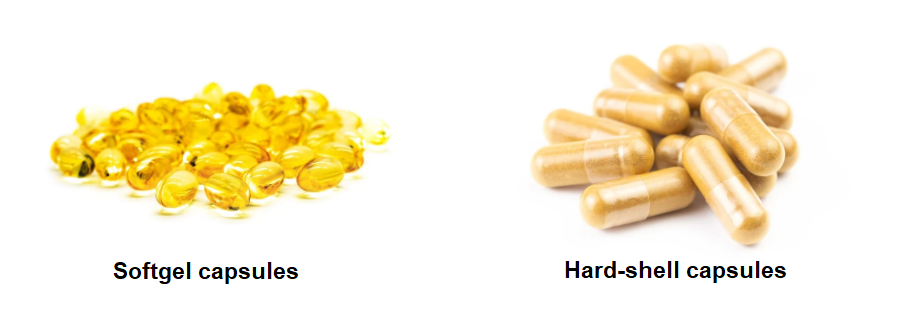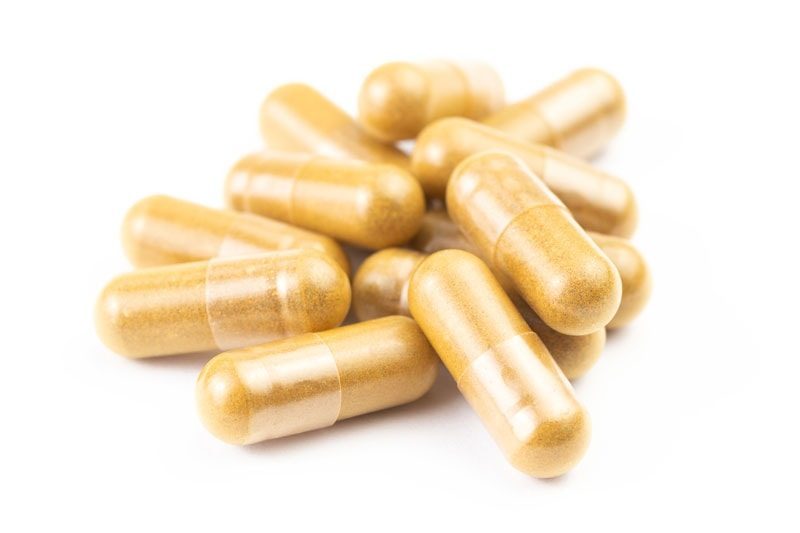If you’re developing a supplement, you should know that the supplement format you choose for your product (tablets, softgel capsules, powders, gummies, etc.) can have a significant impact on both the way it works and how well it sells.
While supplement brands and supplement manufacturers tend to look for formats that contribute to great bioavailability and shelf-life. Consumers are often looking for formats that are easy to swallow, convenient, and not horrible tasting.
Softgel capsules meet many key criteria for both supplement brands and consumers, which is why they’re among the most preferred supplement formats.
Are you considering adding softgel capsules to your line of supplement products? In this article you’ll learn all about softgel capsules, including the advantages and disadvantages of softgels for both brands and consumers.
Contents
What are softgel capsules?
Softgel capsules are pills, containing vitamins, minerals, amino acids, or other forms of dietary supplements, that are meant to be swallowed. Once swallowed, the contents of the capsule, including its active ingredients, are released into the bloodstream through the digestive tract.
There are two primary pill formats: tablets and capsules. Tablets are made by compressing powder ingredients together. These powder ingredients include both active ingredients and binding agents. Capsules are not made by compressing powder ingredients with binding agents. Rather, for capsules, the pill’s active ingredients are enclosed in an outer shell. Once swallowed, the outer shell is broken down, and then the pill’s ingredients are released into the digestive tract.
Likewise, there are two types of capsules: softgel capsules and hard-shell capsules.

Softgel capsules vs hard-shell capsules
There are two main differences between softgel capsules and hard-shell capsules.
The first difference has to do with the kind of ingredients they carry. Hard-shell capsules typically hold powder ingredients. Softgel capsules hold liquid ingredients.
The second major difference has to do with the way they’re made to hold their ingredients. Hard-shell capsules consist of two halves that come together to form an enclosed casing around the powder ingredients. Softgels, on the other hand, are produced in a process known as encapsulation which can best be described as a form/fill/seal process.
Although there are only two primary differences between softgels and hard-shell capsules in terms of what they are and how they’re made, there is quite a bit of difference in terms of benefits for supplement brands and consumers. Below, you’ll find some comments and key considerations regarding softgel capsules.

Key considerations for supplement brands
Softgel capsules have great bioavailability.
When a pill is ingested, not all of its active ingredients are always absorbed into the bloodstream. Bioavailability is defined as the proportion of the supplement’s active ingredients that are actually absorbed into the blood.
Bioavailability can have a huge impact on supplement sales. If a large portion of a supplement’s active ingredients are not properly absorbed into the blood, the supplement will be less effective, ultimately disappointing (and sometimes hurting) consumers.
Compared to other supplement formats like tablets, hard-shell capsules, and powders, softgels have great bioavailability. This is for two primary reasons:
- Liquid vitamins have better bioavailability than powder ingredients, and softgels contain liquid ingredients.
- Contrary to tablets and hard-shell capsules, softgel capsules have a soft shell that’s more easily dissolved.
Softgel capsules have very fast absorption rates.
Absorption rate is related to bioavailability, but they’re not the same thing. While bioavailability refers to how much of the supplements active ingredients are absorbed into the bloodstream, absorption rate refers to the speed of absorption or how long it takes for the ingredients to be absorbed.
Different supplement formats have different rates of absorption. Some formats like liquids and softgels, are absorbed faster than others.
That being said, faster isn’t always better. For supplements with higher potencies, slower absorption rates are preferred. The body can’t absorb so much so fast. If the supplement supplies too many active ingredients at once, what’s not absorbed in time will end up as waste. On the other hand, fast absorption rates are crucial for some supplements, especially supplements that provide energy like pre-workouts.
The point is: If you’re thinking about manufacturing softgels, keep their fast absorption rates in mind.
Softgels are rather durable (long-lasting).
Durability (shelf-life) is important for both supplement brands and consumers. Brands need durable supplements because they need sufficient time to be able to sell their supplements. And, to state the obvious, consumers prefer durable supplements because expired supplements are useless.
Despite their instability, while manufacturing, once manufactured, softgels are among the most stable, durable, and long-lasting supplement formats. In fact, active ingredients in softgels last longer than active ingredients in hard-shell capsules, liquids, and powders.
Softgels are extra durable for two reasons. First, the gelatin exterior adds superior protection for the active ingredients inside. Second, since the materials inside are completely sealed and airtight, they’re never exposed to external factors.
Active ingredients in liquids and powders are exposed to external factors each time their containers are opened and closed. Hard-shell capsules offer some protection, but because hard-shells consist of two parts, air, moisture, and other environmental factors can seep in.
Softgel capsules are easy to customize.
In the competitive industry of dietary supplements, customization is extremely important. Customized supplements can make your brand stand out from the rest, help you appeal to your specific niche customer, and help you create more brand awareness. If consumers can see your capsule and know it’s from your brand without even looking at the bottle, you know you’re doing a great job.
Softgels offer a lot of customization options in terms of colors, shapes, and sizes. The possibilities are almost endless. Just make sure you choose a supplement manufacturer that can customize your softgel capsules the way you want.
Softgels are easy to swallow.
Swallowing pills is a big issue for many consumers:
- Between 30 and 40% of the adult population has difficulty swallowing pills. [1]
- About 20% of aged care residents reportedly skip medications because of their inability to swallow them. [2]
- More than 25% of kids have difficulty swallowing medication. [3]
One of the greatest benefits of softgels is that the softness, smoothness, and flexibility of softgel capsules makes them easier to swallow than other pill formats. In fact, multiple surveys have shown that consumers prefer softgel capsules to other pill formats because they’re easier to swallow. [4]
Softgels can be quite expensive.
Of all pill formats (softgels, capsules, and tablets), softgels are usually the most complicated to manufacture and, as a result, the most expensive. Finding a softgel manufacturer with competitive prices can be quite a challenge.
First of all, softgel manufacturing requires special additional pharmaceutical equipment that’s not required for other pill formats. Such equipment includes gelatin melters, reactors to prepare the fill material, encapsulators, tumble dryers, drying trays, and drying tunnels, just to name a few. The cost of all of this machinery adds up and affects the final price of softgel manufacturing. Not to mention, many supplement manufacturers need a separate room for softgel manufacturing to house all of this equipment. This also adds to the cost.
Another key factor affecting price has to do with environmental requirements when manufacturing softgels. Since softgel manufacturing requires high heat and humidity, supplement manufacturers must take special measures to control these environmental factors when manufacturing. The need for controlled environment rooms also adds to the cost.
Plant-based options are complicated.
Vegetarianism and veganism are up-and-coming trends that supplement brands, along with all other food producers, must learn to accommodate. [5]
In a 2018 gallup poll, consisting of 1,033 adult Americans, surveyors concluded that between 5 and 8% of Americans are vegetarians. [6] In another study, involving 607 consumers in the UK, France and Italy, researchers found that more than three-quarters of respondents preferred plant-based options for their supplements. [7]
This preference for plant-based supplements poses a couple of problems for softgel manufacturers:
- Plant-based capsules are even more expensive.
- Plant-based shells aren’t as strong as animal-based gelatin.
- Plant-based gelatin is more difficult to work with in terms of encapsulation.
- Plant-based gelatin is more porous. This means the ingredients inside are exposed to environmental factors, ultimately hurting the durability of the supplement.
If your target audience is absolutely opposed to animal-based products, it might be better to use a different supplement format.
Some formulations are challenging for softgels.
Pharmaceutical formulation, or supplement formulation, is the process in which different chemical substances, including the active supplement’s active ingredients, are combined to produce a final medicinal product.
The process of formulation poses two significant challenges for softgel manufacturers:
- Some ingredients, like probiotics, can’t handle the heat and humidity that’s necessary for softgel manufacturing.
- Some ingredients, particularly powder ingredients, don’t blend well into an oil base – a necessary step for softgel formulation.
That being said, there is technology available to combat these challenges, and the best softgel manufacturers use these technologies during formulation. Just keep in mind that softgel manufacturers with this advanced technology will likely charge a higher price for their services.
Conclusions: Choosing an appropriate supplement format
It’s important to weigh the pros and cons of various supplement formats when choosing an appropriate format for your supplements.
For softgels, the pros include:
- Great bioavailability
- Fast absorption rates (although not always a benefit)
- Long-lasting / Long shelf-life
- Customization options
- Easy to swallow
The disadvantages include:
- Price
- Complications with plant-based options
- Complications with formulation
Of course, other supplement formats have unique pros and cons as well.
One of the best ways to ensure that you’re choosing the right format for your supplements is by choosing a supplement manufacturer that can offer you advice. That way, you can get tips and advice from experts who not only understand supplement format options but also understand the industry, your exact product, and the needs of your customers.
Generation Nutra for your softgel manufacturing

Generation Nutra offers many types of supplement formats, including tablets, softgels, capsules, liquid vitamins, powders, and gummies. Here are some additional benefits of building your supplement brand with Generation Nutra:
- Thousands of raw materials to choose from so you can create unique and personalized formulas.
- Advice in terms of formulation.
- Various packaging formats to choose from so you can customize your product.
- A team of in-house graphic designers to help you design custom labels for your brand.
- Advice and guidance to help you market and sell your product.
Ask Generation Nutra what we can do for you!
Contact us
References
- https://www.ncbi.nlm.nih.gov/pmc/articles/PMC4589822/
- https://www.ncbi.nlm.nih.gov/pmc/articles/PMC6065591
- https://www.ncbi.nlm.nih.gov/pmc/articles/PMC4184198/
- https://cdn.sanity.io/files/0vv8moc6/nutrioutlook/06f93cd036146638e58bbcd88b9994e44e29e1dd.pdf
- https://www.persistencemarketresearch.com/market-research/softgel-capsules-market.asp
- https://en.wikipedia.org/wiki/Vegetarianism_by_country
- http://japan.catalent.com/index.php/content/download/504/5570/file/wp_consumerws%20prefer%20oral%20forms.pdf


